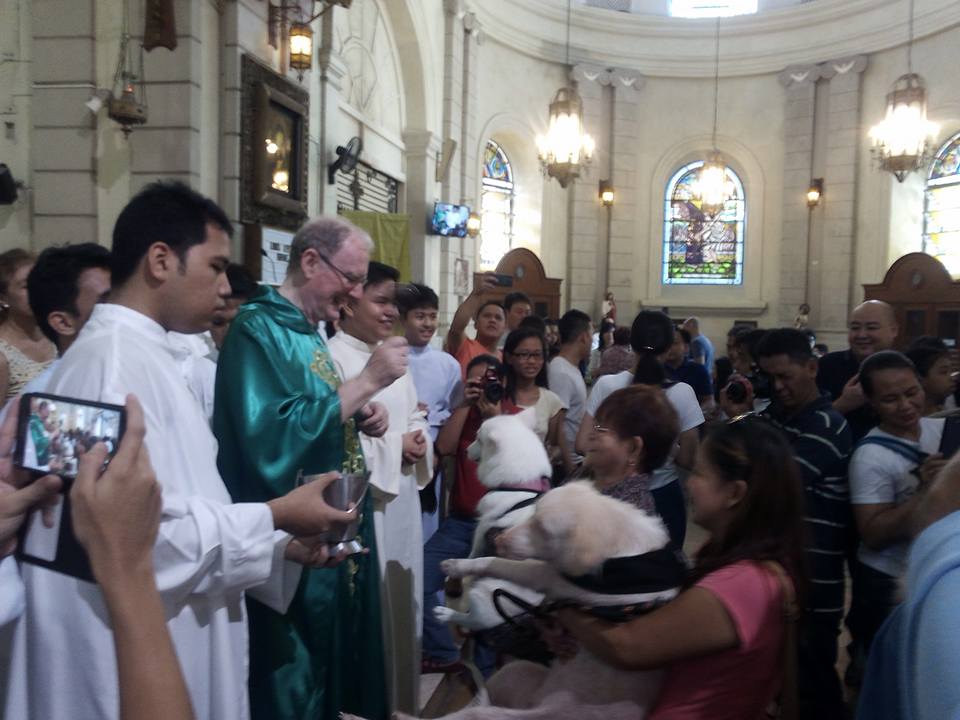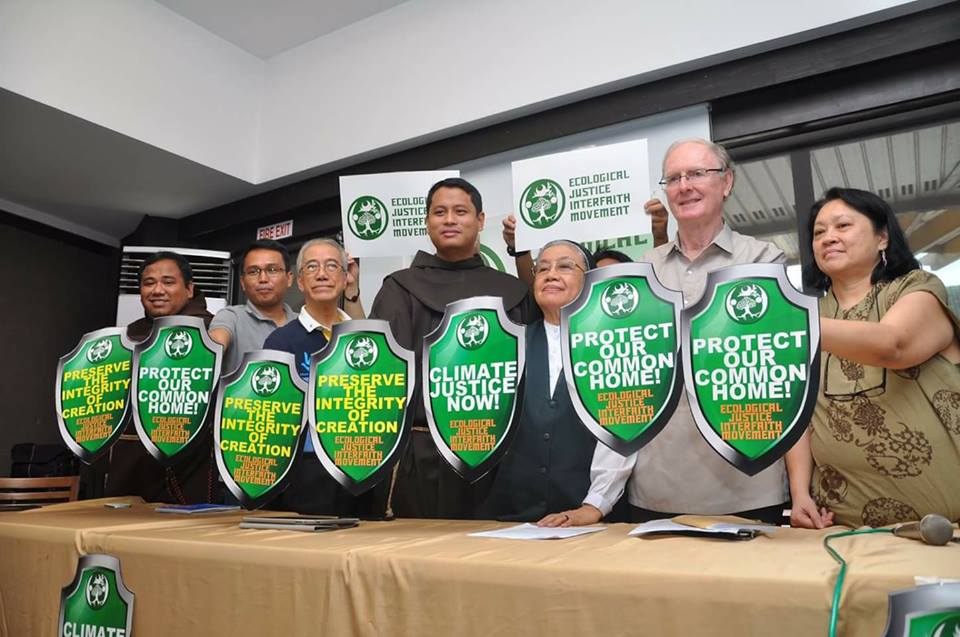Human Love of Creation
By Fr John Leydon
Fr John Leydon is Vice-Director of the Missionary Society of St Columban in Philippine Region. He has been part of the team in Our Lady of Remedies Parish, Malate, Manila, for many years, some of them as parish priest. He has been involved with the Center for Ecozoic Living and Learning (CELL) in Silang, Cavite and was one of those who established it in 1998. Fr John is a member of the steering committee of Global Catholic Climate Movement, became one of the co-convenors of GCCM for the Philippines and currently its chairperson. The idea of GCCM came in 2014 and in June 2016, GCCM-Pilipinas was established.
How do we convince people to take climate change and other environmental concerns seriously?
This is the key issue of our times. Up to very recently the situation was very bad. Scientists as early as 1992 said that humanity and nature are on a collision course. If we don't change our ways, we will experience irreversible changes in our world. Scientists spoke clearly about the present ecological crisis but not enough people were listening. The corporations were plainly making money out of the situation. And the politicians who had utang na loob (sense of obligation to return a favor) to the corporations were obliged to give in to their demands. Laudato Si’ changed all that. Laudato Si’ was a hulog ng langit talaga (heaven sent). For example, President Obama came to the Philippines for the Asia-Pacific Economic Cooperation (APEC) Summit in 2015 and made a strong talk about Climate Change. He could not have made that speech before Laudato Si’ was published. It would have been political suicide.
What gives you hope?
What gives me hope is that I believe that God is not sleeping. God is the Creator and God loves creation. God has planted within the heart of every human great love for creation. And how are we going to change things? We need to touch that part of humanity's heart which loves creation. Right now we are encantada. We have been enchanted by what Pope Francis would call the technocratic paradigm, which is another name for our modern civilizaton characterized by great technological advancement but at the cost of great and possibly irreversible destruction of Planet Earth.
One of the things that Laudato Si’ clearly teaches, which has not been taught for hundreds of years in the Catholic church, is that God is really present in every creature and that God really speaks through every creature. I often ask people, "Where do you think we hear the voice of God?" Evangelicals will say with certainty, “Scriptures” and usually mean “scriptures only” following Martin Luther’s “scriptura sola”. Catholics usually say, “Scriptures” and maybe some will say, “in the sacraments".
In the Middle Ages, Thomas Aquinas would have taught , "There are two sources of revelation, one is Sacred Scripture and the other is Nature". Nature was approached with awe and wonder. He was opposed by another school which said that Nature was not a source of revelation of God. They said that Nature had nothing to do with faith. It was only there for our intellect. What this meant was that the primary way of treating Nature was to understand it and get control of it. Laudato Si’ finally settles this debate by taking the side of Saints Francis, Aquinas and Bonaventure. God speaks to us in creation and we should approach creation with a sense of awe and wonder.

Fr John blessing the animals on the feast of St Francis of Assisi, 4 October 2016, Malate Parish, Manila
The modern technocratic paradigm was born under a different attitude to Nature. Meaning that nature is there but it has no value in itself. It can be used in any way we want. And we are now reaping the fruits of this which is the destruction of our planet.
Seeing things in this way is like discovering that we are living in a time of great revelation. We discover ourselves in our modern technological civilization as being deaf to the voice of God speaking to us in creation. We are very smart and clever but basically autistic when it comes to recognizing God’s voice. And because of this we find ourselves destroying creation and in it wiping out the voice of our God. And for the most part we have no idea that this is what we are doing.
In many ways we find ourselves in a situation very similiar to that of the people who had crucified Jesus. They did not know what they were doing. In fact they thought they were doing God’s will: “We have a law and by that law this man should die.” And when he comes back to them alive, then they say, "Oh, what did we do?" Jesus is being crucified today in the lost species, in the destruction of the ecosystems and we are weeping upon realizing that. Yes, it is happening. “What are we to do?” is the question asked when we undergo conversion. Many are going through this process. I don’t know if it is fast enough but I still have hope.
We are called to ecological conversion. When we are ecologically converted, everything is reexamined. We reexamine our lifestyle and mend our wrongful ways. We believe that God is present. God is speaking to us in every little creature. And God is leading us to deep, deep conversion. The great thing about a conversion is that it can be total and immediate.
Cardinal Luis Antonio Tagle of the Archdiocese of Manila, Philippines invites the faithful to Sign The Laudato Si' Pledge
How do we help protect our planet?
We could answer this by asking, “What am I supposed to do?” But a more important question that we can ask is, “Who am I supposed to be?” Who does God want me to be: a consumer, a destroyer, or somebody who hears the voice of God? As Pope Francis would say, in being a Christian today, care for creation is not an optional thing. But to be an authentic Catholic today is to be able to hear the voice of God in the cry of the poor and the cry of the earth.
E.O. Wilson said that we humans are basically biophiliacs. We are lovers of life. When we hear about things breaking down, like species disappearing and all that, then we can feel very sad and a lot of pain. Spiritual writer Joanna Macy says something very interesting about our pain:
“The anguish we feel for what is happening to our world is inevitable and normal and even healthy. Pain is very useful. Just don’t be afraid of it. Because if we are afraid to feel that, we won’t feel where it comes from, and where it comes from is love, our love for this world. That’s what is going to pull us through.”
If we ponder on this long enough, we will discover that in our hearts is love – we are deeply in love with creation. God has planted this love in our hearts. And that is the only thing that can save us. If we can get in touch with that, it's the most hopeful thing in the planet at this point – human love of creation.

(L-R) Bro Angel Cortez OFM, NCR regional coordinator, Ecological Justice Interfaith Movement (EcoJIM); Gerry Arances, national coordinator, Philippine Movement for Climate Justice (PMCJ); Max de Mesa, chair, Philippine Alliance of Human Rights Advocate (PAHRA); Fr Dexter Toledo OFM, national coordinator, EcoJim; Sr Cres Lucero SFIC, Association of Major Religious Superiors of the Philippines (AMRSP) – JPIC; Fr John Leydon, Global Catholic Climate Movement (GCCM); and Lidy Nakpil, regional coordinator, Asian Peoples Movement on Debt and Development (APMDD) at the launching of EcoJIM, 31 Aug 2015, Quezon City.
EcoJIM is a faith-based network on Climate Justice in response to Pope Francis’ call, "On Care For Our Common Home", Laudato Si’. (Photo Credit: EcoJIM)
